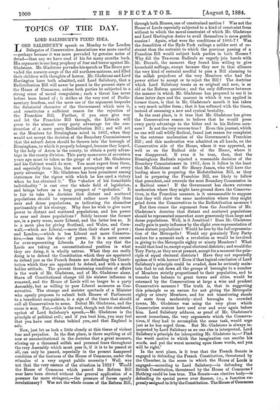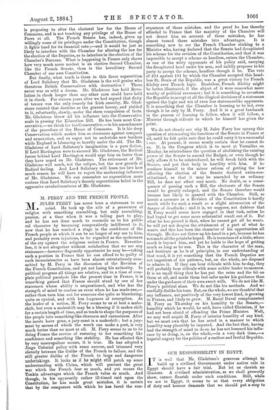TOPICS OF THE DAY.
LORD SALISBURY'S FIXED IDEA.
TAOED SALISBURY'S speech on Monday to the London Delegates of Conservative Associations was more careful —perhaps because it was more pervaded by genuine notes of dread—than any we have read of his for many months back. His argument is one long prophecy of fear and terror against Mr. Gladstone. Mr. Gladstone pervades his speech as The Bruce per- vaded the nursery-songs of the old northern matrons, and filled their children with thoughts of horror. Mr. Gladstone and Lord Hartington have both admitted, said Lord Salisbury, that a Redistribution Bill will never be passed in the present state of the House of Commons, unless both parties be subjected to a strong sense of moral compulsion ; such a threat has never before been heard of ; it strikes at the very root of Parlia- mentary freedom, and the mere use of the argument bespeaks the dictatorial character of the Government which uses it, and constitutes a sufficient reason for the rejection of the Franchise Bill. Further, if you once give way and let the Franchise Bill through, the Liberals will press to the utmost every party advantage for the con- struction of a mere party Redistribution Bill ; and will act as the Members for Birmingham acted in 1867, when they would not accept the decision of the Boundary Commissioners that the suburb Aston should be thrown into the borough of Birmingham, to which it properly belonged, because they hoped, by the help of Aston in the county, to obtain a party advan- tage in the county division. This party manceuvre of seventeen years ago must be taken as the gauge of what Mr. Gladstone and his Cabinet would do now. You must expect from them, and especially from him, the most peremptory use of every party advantage. "Mr. Gladstone has been prominent among statesmen for the rigour with which he has used a victory when he has obtained it." The "shadow of his formidable individuality" is cast over the whole field of legislation, and brings before us a long prospect of "spoliation." It is fair to take his doctrine that distant and scattered populations should be represented rather more fully than near and dense populations, as indicating the shameless partisanship of his strategy. Why does he wish to give more power to distant and scattered populations, and less power to near and dense populations ? Solely because the former are, in a party sense, more Liberal, and the latter less so. It is a mere plea for giving Scotland, and Wales, and Corn- wall,—which are Liberal,—more than their share of power ; and London,—which is less Liberal and more Conserva- tive,—less than its share of power. It is a mere excuse for over-representing Liberals. As for the cry that the Lords are taking an unconstitutional position in what they are doing, it is wholly untrue. What they are really doing is to defend the Constitution which they are appointed to defend just as the French Senate are defending the Consti- tution which they are appointed to defend, and with a much bolder attitude. The present threatening condition of affairs is the work of Mr. Gladstone, and of Mr. Gladstone alone. Stave off Constitutional change till his sinister influence is removed, and the House of Lords will no longer be a party Assembly, but as willing to pass Liberal measures as Con- servative. The strange and sinister spectacle of a Minister who openly proposes to submit both Houses of Parliament to a beneficent compulsion, is a sign of the times that should call all Conservatives to arms. Defeat Mr. Gladstone, and the cause is won. For,—this is the real, though not the confessed, upshot of Lord Salisbury's speech,—Mr. Gladstone is the principle of political evil ; and if you beat him, you may feel that you have cast Satan behind you, and that England is safe.
Now, just let us look a little closely at this tissue of violent fear and prejudice. In the first place, is there anything at all new or unconstitutional in the doctrine that a great measure, stirring up a thousand selfish and personal fears throughout the very Assembly which must pass it, if it is to be passed at all, can only be passed, especially in the present hampered condition of the business of the House of Commons, under the stimulus of a very urgent public necessity? Well, was not that the very Ranee of the situation in 1882? Would the House of Commons which passed the Reform Bill ever have been elected without the general application of a pressure far more stringent,—the pressure of forces openly revolutionary? Was not the whole course of the Reform Bill,
through both Houses, one of constrained motion ? Was not the House of Lords especially subjected to a kind of constraint from without to which the moral constraint of which Mr. Gladstone and Lord Hartington desire to avail themselves is mere gentle suasion ? Again, what were the conditions of 1866-7? Waft the demolition of the Hyde Park railings a milder sort of re- straint than the restraint to which the previous passing of a Franchise Bill would subject both parties in both Houses ? Why did the Tea-room Radicals so eagerly join hands with Mr. Disraeli the moment they found him willing to give household suffrage, except because they saw in that alliance the very kind of restraint needful to pass a Bill alarming to the selfish prejudices of the very Members who had the power either to accept or to reject the Bill? The doctrine which Lord Salisbury treats as so original and new, is afi- eld as the Reform question ; and the only difference between. the manner in which Mr. Gladstone has proposed to use it in these latter days and the manner in which it was applied in former times, is that in Mr. Gladstone's mouth it has taken a very much milder form ; that it has softened with the times, instead of assuming a new and cynical brutality.
In the next place, is it true that Mr. Gladstone has given. the Conservatives reason to believe that he would press every party advantage to the bitter end in his Reform mea- sure? Is not the very reverse true ? Even this journal, which no one will call wildly Radical, found just reason for complaint in the extreme moderation of the Government's Franchise Bill ; and this moderation was admitted on all hands, on the Conservative side of the House, where it was approved, aa well as on the Radical side of the House, where it was disapproved. If even it be true, then, that the Birmingham Radicals rejected a reasonable decision of the. Boundary Commissioners in 1867, does it follow in the least that Mr. Gladstone and Sir Henry James, who will have the leading share in preparing the Redistribution Bill, as they had in preparing the Franchise Bill, are likely to follow that precedent, and overrule the next Boundary Commission in a Radical sense ? If the Government has shown extreme moderation where they might have ground down the Conserva- tives, in the Franchise measure, is it unreasonable to suppose that they will show the same moderation where they might grind down the Conservatives in the Redistribution measure?
But then comes the argument from the Jesuitism of Mr. Gladstone's doctrine that distant and scattered populations should be represented somewhat more generously than large and dense populations. Well, is it Jesuitical ? Does Mr. Gladstone really gain in party influence by the slight over-representation of these distant populations ? Would he lose by the full representa- tion of the Metropolis ? Would any genuinely Tory Party endure for a moment such a revolution as would be involved in giving to the Metropolis eighty or ninety Members ? What would that lead to, except equal electoral districts; and would the Tory Party, as they are at present, accept for a moment the prin- ciple of equal electoral districts? Have they not repeatedly spoken of it with horror? Even if that logical conclusion of Lord Salisbury's principle could be evaded, does he seriously main- tain that to cut down all the groups of boroughs to a number of Members strictly proportioned to their population, and to transfer the balance to great towns and cities, would be esteemed by the Conservatives at large a wise and prudent Conservative measure ? The truth is, that in suggesting this principle as an excuse for not giving the Metropolis eighty or ninety Members, and for not transferring shoals of seats from moderately - sized boroughs to crowded towns, Mr. Gladstone was using the Very pleas which Conservative orators have used over and over again before him. Lord Salisbury adduces, as proof of Mr. Gladstone's secret iconoclasm, the very arguments which the Conserva- tives, if they had to accomplish the same task, would urge just as he has urged them. But Mr. Gladstone is always in- terpreted by Lord Salisbury as no one else is interpreted. Lord Salisbury's principle for interpreting Mr. Gladstone is,—' Find the worst motive to which the imagination can ascribe his words, and put the worst meaning upon those words, and you will be right.'
In the next place, is it true that the French Senate is engaged in defending the French Constitution, threatened by the Chamber, in the sense in which the House of Lords is engaged—according to Lord Salisbury—in defending the British Constitution, threatened by the House of Commons? Nothing could be less true. The Senate—an elective body—is defending its special power over finance, i.e., a function ex- pressly assigned to it by the Constitution. The House of Commons
is proposing to alter the electoral law for the House of Commons, and is not touching any privilege of the House of Peers at all. The French Senate has, indeed, given up willingly some of its privileges under the Constitution, though it fights hard for its financial veto ;—and it would be just as likely to interfere with the Chamber for altering the law for the election of the Deputies, as to interfere in the election of the Chamber's Bureaux. What is happening in France only shows how very much more modest is an elective Second Chamber, like the French Senate, than is the hereditary Second Chamber of our own Constitution.
But finally, what truth is there in this fierce superstition of Lord Salisbury that Mr. Gladstone is the evil genius who threatens British Conservatives with destruction ? There never was so wild a dream. Mr. Gladstone has held Revo- lution in check longer than any other man could have held it in check. For sixteen years after we had argued that fixity of tenure was the only remedy for Irish anarchy, Mr. Glad- stone resisted that doctrine as the gravest heresy, and yielded to it, reluctantly, slowly, under the stern compulsion of facts. Mr. Gladstone threw all his influence into the Conservative scale in passing the Education Bill. He has been most Con- servative,—we think far too Conservative,—in his amendments of the procedure of the House of Commons. It is his deep Conservatism which makes him so strenuous against conquest and annexation, and so eager not to undertake new burdens while England is labouting so heavily under the old. The Mr. Gladstone of Lord Salisbury's imagination is a pure fiction. If Lord Hartington were to succeed Mr. Gladstone, the Radical forces behind Lord Hartington would urge him on faster than they have urged on Mr. Gladstone. The retirement of Mr. Gladstone will mark, not the eclipse, but the new growth of Radical feeling. And Lord Salisbury will learn too late how much reason he will have to regret the moderating influence of Mr. Gladstone. We can remember no superstition more curious than Lord Salisbury's fiercely superstitious belief in the aggressive revolutionariness of Mr. Gladstone.



































 Previous page
Previous page